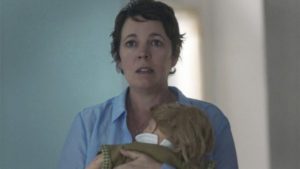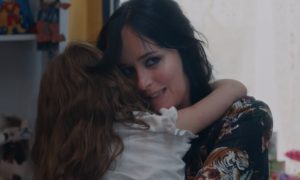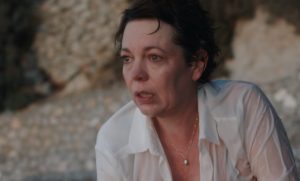The Problem with Netflix's 'Red Notice'
Welcome to Ryan Reynold's world. Dwyane Johnson, Gal Gadot and us are just living in it. Is he acting? I think he is, it's just the question of it's believable anymore.


This article contains spoilers.
The Lost Daughter follows a college professor, Leda (Olivia Colman), on holiday in Greece, as she inserts herself into the life of a young woman named Nina (Dakota Johnson). This is the directorial debut of Maggie Gyllenhaal. The film is an adaptation of a novel by Elena Ferrante of the same name.

Elena, Nina’s daughter, goes absent for a short period, and this is how the two ladies meet. She finds Elena but, unbeknownst to anyone, keeps the doll the small girl had with her. Leda wistfully gazes at Nina, even being moved to tears simply by the sight of Nina and her daughter playing alongside the water. Leda often seems out of touch with her environment. We see a much younger Leda with her daughter in flashbacks, and we get the impression that young motherhood was difficult for Leda, perhaps fraught with deep melancholy or depression.

We gain a peek into things she might have appreciated in raising her daughters as she reminisces with the young man working at the hotel that Leda is staying at, named Will, played by Paul Mescal. Will tells Leda that she is beautiful and that her daughters must be as beautiful as she is. Leda says that her own mother was quite beautiful, but when she was around the same age as her daughters, she felt as though her mother had kept the secrets to her beauty to herself and by creating her, she’d separated herself from Leda, like pushing a plate away if the food is repulsive. A flashback to her own daughters playing with a doll much like Elena, given to Leda by her mother, and its eventual destruction.

During a walk, Leda comes across Nina and Will, who are romantically involved. She thinks about her own affair with an older professor, as well as the impact it had on her marriage and on herself. While she is shopping at an antique jeweler, Leda gifts a hairpin to Nina, as Nina reveals her awareness of Leda’s knowledge of the affair. Nina mentions how she met her husband, Toni (Oliver Jackson-Cohen) when they were both young. That he doesn’t get tired as she does. She proudly proclaims that she’s happy. Leda confesses she abandoned her two daughters when they were seven and five years old, only to return three years later.
Later that same night, Will asked her to allow the pair to use the apartment for a couple of hours. In the aftermath, Leda and Nina have a candid conversation about the kindred feelings they share. Does the feeling ever go away? Why does it come and go? Leda refers to herself as an “unnatural mother,” and when asked what Nina should do, she replies, “whatever you want.” She returns the doll to Nina and tries to make amends for having taken it and not returning it sooner, even though she saw what its loss did to both Elena and Nina. In a fit of rage, Nina stabs Leda with a hairpin.
The film ends with Leda calling her daughters from a beach after passing out from the pain of being stabbed. A fitting ending for a woman so clearly haunted by her choices as they happened and how she wishes they had. The film balances motherhood and both its blessings and cruelty, showing perhaps how motherhood, once examined, can feel unnatural. Does anyone ever get a guidebook on how to be a mom?

The Lost Daughter doesn’t paint over the choices Leda and Nina make as mothers as right or wrong but examines the messy in-between. Motherhood can often feel like the lines between your identity as a person and your role as a mother combine and blur in a way that rarely happens with fathers.
Related lists created by the same author
Welcome to Ryan Reynold's world. Dwyane Johnson, Gal Gadot and us are just living in it. Is he acting? I think he is, it's just the question of it's believable anymore.
Related diversity category
The Franke kids seemingly lived a normal life, until their mom met the infamous Jodi Hilderbrandt.
Related Movie / TV / List / Topic
Disney has a glaring and, up until recently, unaddressed issue that spans nearly its entire lifetime - an absence of diversity.